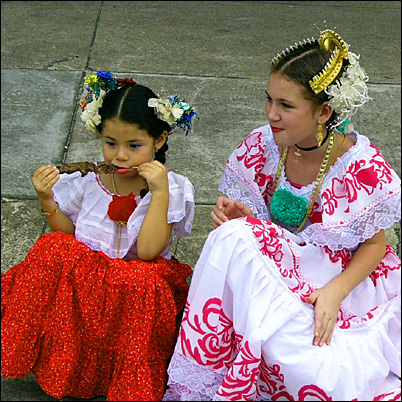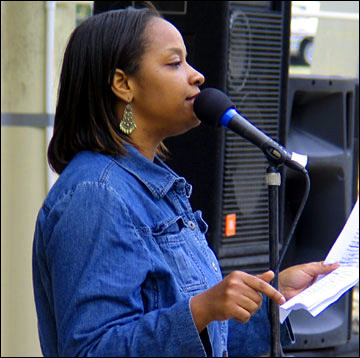 |
 | |||||||||||
The Army Townpart 1 2 3 4 5 6 7 8
Every September since the late 1970s, Fayetteville has held an International Folk Festival on its downtown streets. There's food, costumes, and traditional dance from countries across the world. "Fayetteville is one of the most diverse cities in the entire country," says Mayor Pitts. "We have over 82 countries, 82 cultures represented in our community. So we're very proud of that. … And that's because our military men and women, they happen to go all across the world and fall in love, so that's a good thing." A highlight of the festival is a parade of nations, a miniature Olympic opening ceremony through the town square. This time, about 30 nations are represented, from Argentina to Vietnam. The largest delegations come from places with big U.S. Army posts: Japan and Okinawa, Korea, the Philippines, Panama, Puerto Rico. Diversity among the people of Fayetteville extends to opinions about the Iraq War. In March, 2005, on the second anniversary of the start of the War, about 3,000 people join an anti-war march and rally in Fayetteville. It's billed as the biggest anti-war demonstration in town since 1971 when Jane Fonda came here to protest the Vietnam War. The protesters chant, "Hell no, we won't go! We won't kill for Texaco!" Caroline Mabry drove down from Raleigh for the protest. She carries a sign that reads, Military Brat for Peace. "My father was in the military and he died during the Vietnam conflict," Mabry says. "And my brother is in Iraq, has just gotten back from ten months in Iraq, and they're already trying to send him back." Some other protestors came from Chapel Hill, Washington D.C., and beyond. A couple hundred counter-demonstrators stand across the street from the peace rally. Many dismiss the anti-war protestors as outside rabble rousers. "I disagree with them being here today because D.C. is the place to protest policy," says Chris Dodds, a veteran from nearby Lee County. "Write letters, whatever they need to do, but they don't need to be protesting in the street in a military community where there's no policy made, and just upsetting the wives and children of these veterans that have people deployed overseas." But some of the protesters are military spouses.
But Hollingsworth says she's discovered many others in local military families who oppose the Iraq war. She says her husband is keeping his promise to the Army, to simply do his job. "So that's why I do this work, 'cause he may not be able to say anything," says Hollingsworth. "But I'm not in the Army. And it's kind of like a mother with her child. … I'm gonna stick up for my family, for my husband, for my baby. And I don't care if it's against the president or this whole town. I wouldn't ask another mother to stay silent and not defend her family, so nobody should ask that of me." In fact, 44 percent of local residents polled by the Fayetteville Observer in June 2005 said the war in Iraq was not worth fighting. That opposition was just slightly lower than in national polls. "Fayetteville is a Army town," says Roy Parker. "Got to be classed as an Army town no matter how hard we try to do all these other things and we're trying very hard." He says Fayetteville chose an industry and an identity back in 1918. That's when it landed what was first called Camp Bragg. Then, Fayetteville was a little town on the Cape Fear River. Sort of like a young person from a working-class neighborhood who can't see many career prospects, and visits the military recruiter. "What we have to do," says Parker, "is try to make it a good Army town if we can."
Continue to part 7
| |||||||||||

